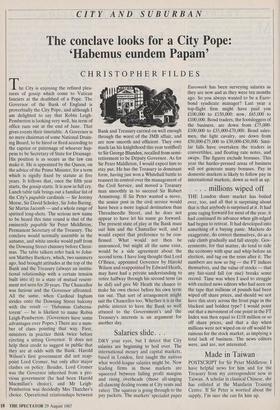CITY AND SUBURBAN
The conclave looks for a City Pope: `Habemus eundem Papam'
CHRISTOPHER FILD ES
T
he City is enjoying the refined plea- sures of gossip which come to Vatican fanciers at the deathbed of a Pope. The Governor of the Bank of England is proverbially the City Pope, and although I am delighted to say that Robin Leigh- Pemberton is looking very well, his term of office runs out at the end of June. That gives events their timetable. A Governor is no mere chairman of some National Drain- ing Board, to be hired or fired according to the caprice or patronage of whoever hap- pens to be Secretary of State for Drainage. His position is as secure as the law can make it. He is appointed by the Queen, on the advice of the Prime Minister, for a term which is rigidly fixed by statute at five years. It follows that, once the fifth year starts, the gossip starts. It is now in full cry. Lunch table talk brings out a familiar list of the City's papabile cardinals — Sir Jeremy Morse, Sir David Scholey, Sir John Baring, Sir Martin Jacomb — and a whole range of spirited long-shots. The serious new name to be heard this time round is that of the eminently papabile Sir Peter Middleton, Permanent Secretary of the Treasury. The conclave would normally assemble in the autumn, and white smoke would puff from the Downing Street chimney before Christ- mas. The table talkers refer back to John- son Matthey Bankers, which, two summers ago, had brought attitudes at the top of the Bank and the Treasury (always an institu- tional relationship with a certain tension built into it) to a state of mutual resent- ment not seen for 20 years. The Chancellor was furious and the Governor affronted. All the same, when Cardinal Ingham strides onto the Downing Street balcony with the result — Ilabemus Guberna- torem' — he is likeliest to name Robin Leigh-Pemberton. (Governors have some advantages over Popes.) There are a num- ber of clues pointing that way. First, ministers in practice think twice before ejecting a sitting Governor. It does not help their credit to suggest in public that they are at odds with the Bank. Harold Wilson's first government did not reap- point Lord Cromer, but only after major clashes on policy. Besides, Lord Cromer was the Governor inherited from a pre- vious government (he had been Harold Macmillan's choice), and Mr Leigh- Pemberton was decidedly Mrs Thatcher's choice. Operational relationships between Bank and Treasury carried on well enough through the worst of the JMB affair, and are now smooth and efficient. They owe much (as his knighthood this year testified) to Sir George Blunden, recalled from semi- retirement to be Deputy Governor. As for Sir Peter Middleton, I would expect him to stay put. He has the Treasury in dominant form, having just won a Whitehall battle to reassert its control over the management of the Civil Service, and moved a Treasury man smoothly in to succeed Sir Robert Armstrong. If Sir Peter wanted a move, the senior post in the civil service would have been a more logical destination than Threadneedle Street, and he does not appear to have let his name go forward. The present state of play at the Bank must suit him and the Chancellor well, and I would expect that preference to be con- firmed. What would not then be announced, but might all the same exist, would be a side agreement about the second term. I have long thought that Lord O'Brien, appointed Governor by Harold Wilson and reappointed by Edward Heath, may have had a private understanding to retire halfway through his second term (as he did) and give Mr Heath the chance to make his own choice before his own term ran out. That sort of arrangement might suit the Chancellor too. Whether it is in the public interest to have the Bank so well attuned to the Government's and the Treasury's interests is an argument for another day.










































 Previous page
Previous page